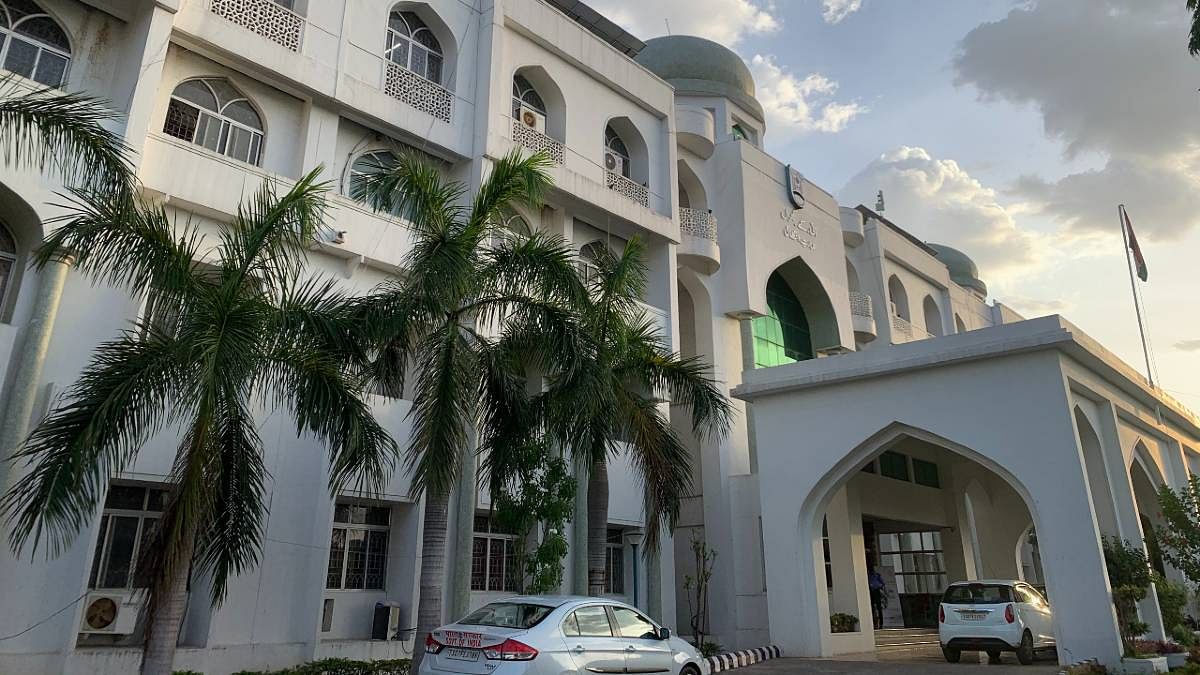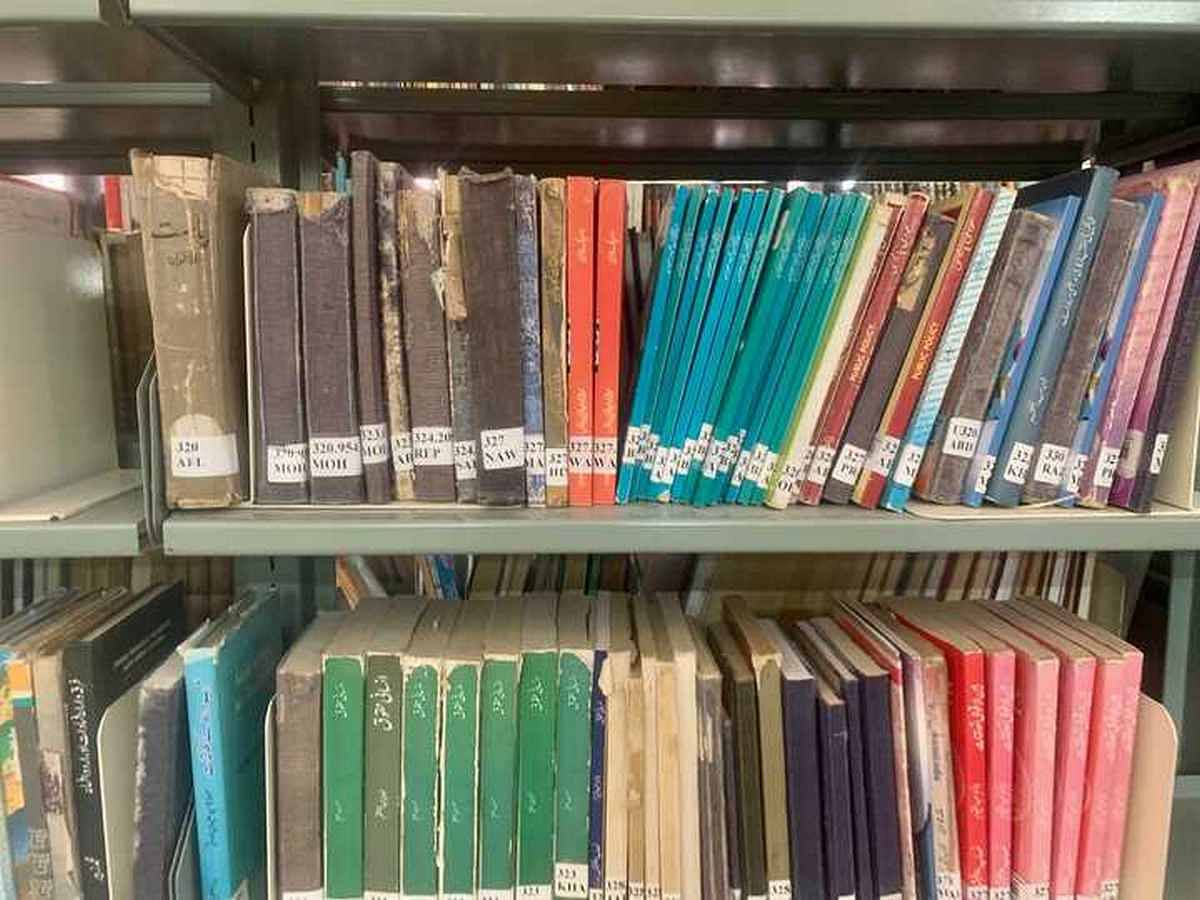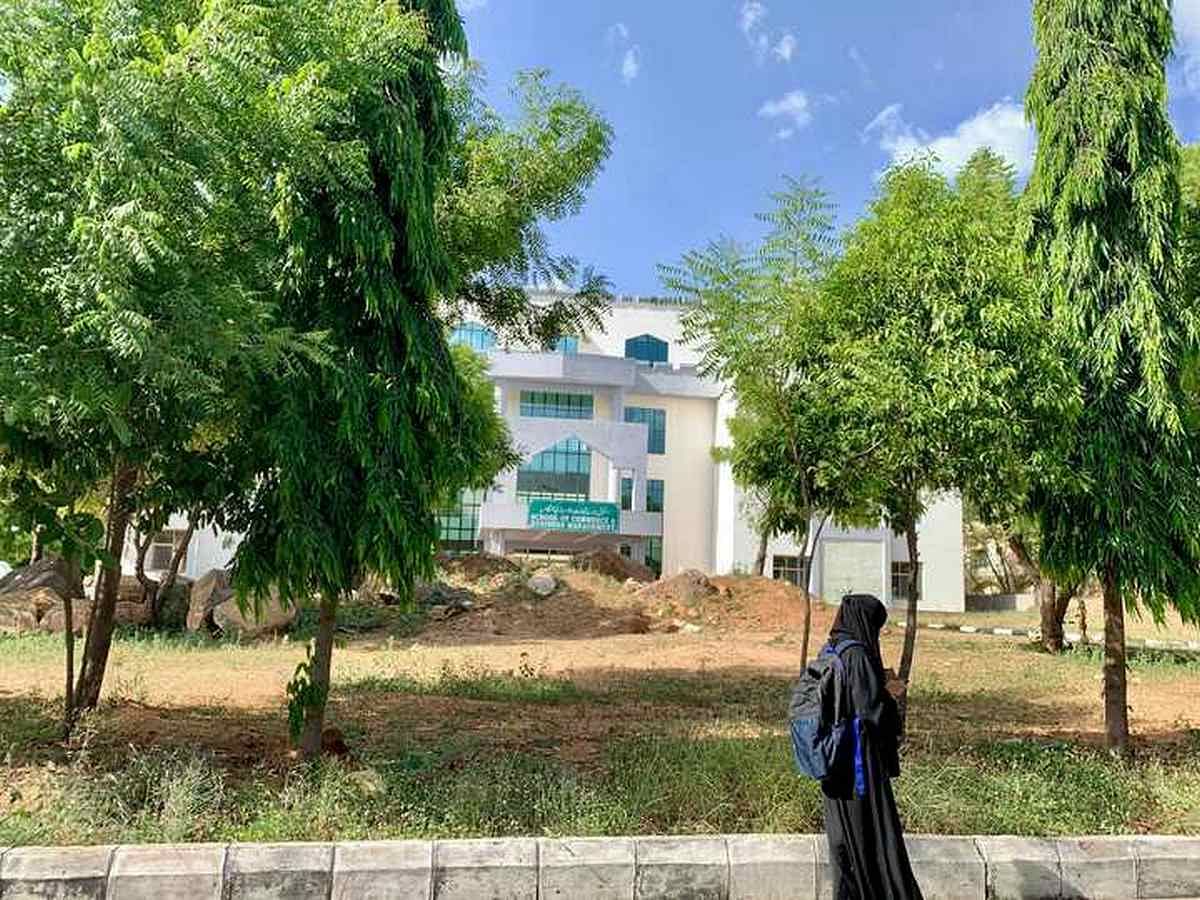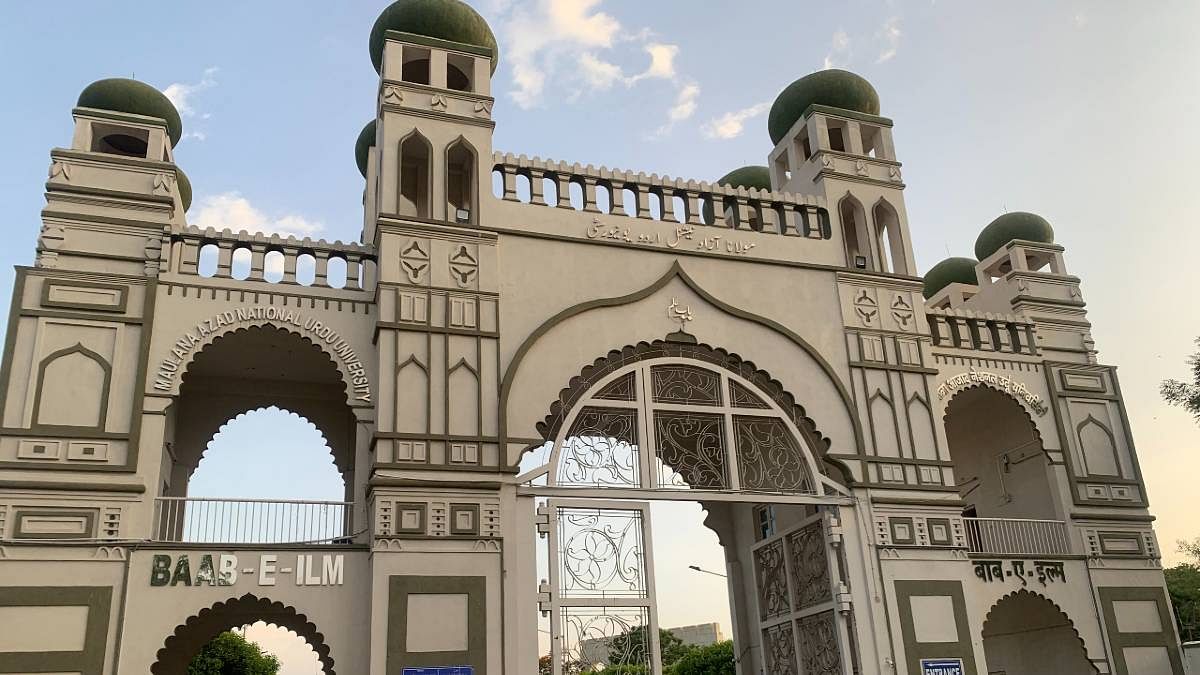Hyderabad: When 13 students from Hyderabad’s Maulana Azad National Urdu University (MANUU) got campus placements as language specialists at Amazon last year, it was a big triumph for the institution. Set up in 1998, the Urdu-medium university is trying to counter the perception that it has limited opportunities for its students, many of whom did their schooling from madrasas.
According to former vice-chancellor Zafar Sureshwala, approximately 50-60 per cent of the students at the university are madrasa pass-outs. Currently, the university’s enrollment stands at around 4,000, with students hailing from different parts of the country.
MANUU is India’s only Urdu-medium central university, providing diploma and degree programmes, from undergraduate to PhD levels, in various fields, including media studies, languages, information technology, and computer science. The only other Urdu-medium institution of its kind is Dr Abdul Haq Urdu University, a state university in Kurnool, Andhra Pradesh.
In 2022, MANUU was awarded an A+ rating by the National Assessment & Accreditation Council (NAAC), up from its earlier A rating.
Officials at the university said the number of applications it receives across its language courses — Persian, Urdu, Arabic, English, and Hindi — far outnumber the seats on offer.
A master’s programme in Urdu in 2022, for example, drew over 200 applications for 30 seats, they said. The same year, the university provided government institutions across states with 1,200 teachers of different subjects.
“Our courses are designed to prepare students for the job market. A lot of importance is given to translation and interpretation,” said Syed Aleem Ashraf Jaisi, professor in MANUU’s Department of Arabic and one of the university’s 357 faculty members, speaking to ThePrint over the phone.
However, despite the progress it has made, the university continues to face challenges when it comes to student placements.
Situated in Gachibowli, Hyderabad’s thriving tech hub, MANUU is surrounded by the offices of global conglomerates and technology companies. But in spite of this advantageous location, students at MANUU say that securing high-quality campus placements is a struggle.
Many contend that venturing out on their own in search of employment yields more promising outcomes.
University officials also acknowledge that the perception of MANUU solely as an Urdu-medium institution for the “minority community” has impeded its efforts to establish a broader academic reputation and cultivate a stronger appeal among recruiters.
To counter this, the university is now focusing on imparting English-language and public-speaking training to students in order to boost their employability.
ThePrint visited MANUU last month to gain insight into campus life, the opportunities available to students, and how the institution is attempting to enhance its profile.
Also Read: ‘Need well-rounded professionals’ — why IITs, IIMs & IIITs are giving humanities a new thrust
‘Amazon had just one complaint…’
Global e-commerce giant Amazon has been coming to Maulana Azad National Urdu University for placements for the last two years, according to Jalsi.
The company’s average annual pay package for the last batch of recruits was over Rs 6 lakh, he said, and it is pleased with the performance of the students.
But there was one complaint from Amazon, said Dr Yousuf Khan, who manages the university’s placements — the students’ English communication skills were not up to the mark.
To address this, the university tied up with the US consulate in Hyderabad last year to offer English-speaking courses.

Umar Faruq Qadri, a student at MANUU, told ThePrint that the English gap was the biggest hurdle in getting jobs for many students.
“When we graduate, companies will take interviews in English. It’s difficult for us to crack it. But we don’t lack anything else that prevents us from qualifying for any competitive exams. Whether it’s English or Urdu (medium of teaching), the subjects are the same,” he said.
Qadri graduated with an MA in English last year, and has now enrolled in a Hindi MA course at the university. He also works as a customer service executive at Genpact, leaving at 3:30 pm every day for his shift.
Other MANUU graduates are also employed at the American firm, working in customer service as process associates, faculty members told ThePrint.
However, not all students are satisfied with the placement opportunities available so far at the campus.
Placement woes
Many of the companies coming to MANUU for campus placements were “low level”—neither prestigious nor high-paying— according to several students who spoke to ThePrint.
For better packages, students said they had to strike out on their own.
“We have to do everything ourselves,” said Saima Abdullah, an undergraduate student at the university.
A resident of Bihar’s Samastipur, Abdullah said she attended a job festival last month at MANUU, organised annually as part of the university’s cultural fest, Jashn-E-Bahara, by the students’ union and placement cell.
Exuding both confidence and frustration, she told ThePrint that she was offered an internship at the fest, but was not taking it. “It was too low-paying,” Abdullah said.
Representatives from over 50 companies are said to have visited MANUU on 12 June for the job fair. According to the estimates of Mohammad Faizan, president of the students’ union, 250 students received on-the-spot job offers at the fair.
“But the big multinationals didn’t come,” he added.
Nevertheless, Faizan said there were some encouraging trends too.
“Earlier, companies weren’t coming for B-Tech and MBA students, but now they are,” he pointed out.
Faizan cited the example of Galaxy Group, a real-estate firm based largely out of Gurgaon and Noida, which was one of the companies that were brought to the university for this year’s job fair through the union’s efforts.
‘Not just an Urdu university’
Faculty members at MANUU concur with the observation that campus placements often fall short in comparison to the job opportunities students secure independently.
“As a general trend, students prefer to apply on their own since they get better packages,” said professor Abdul Wahid, dean, School of Technology.
By his estimate, all students in his department last year secured jobs on their own.
However, he also reinforced that this was not a reflection of the standard of education being imparted at MANUU.
“It’s an Urdu-medium university, but the quality of education is comparable to that of Osmania University, Delhi’s Jamia Millia Islamia, or Aligarh Muslim University (AMU),” he added.

University registrar Ishtiaq Ahmed, an expert in Persian studies who previously taught at Jawaharlal Nehru University, told ThePrint that student placements as well as faculty research publications “have been quite good over the past five years”.
He also highlighted an increase in international citations for research papers produced by faculty members.
However, Ahmed expressed his dissatisfaction over MANUU’s “reputation as an Urdu university” and an “institute for the minority community”.
“People get a feeling that this is an Urdu university only. But we have everything. And our vice-chancellor (Syed Ainul Hasan) is keen to expand,” Ahmed said.
Students and faculty members alike emphasise that MANUU not only offers an array of academic programmes, but also has substantial non-scholastic facilities, including for sports, theatre, and the fine arts.
University Grants Commission (UGC) chairperson, M. Jagadesh Kumar, told ThePrint that he was pleased with MANUU’s improved NAAC grade.
“The university is doing very well by offering programmes in emerging areas like fashion technology and teacher education,” he added.
‘Homecoming for madrasa students’
MANUU was established in 1998 by an Act of Parliament to “promote and develop the Urdu language and to impart vocational and technical education in Urdu medium through conventional and distance modes”.
To be eligible for admission, students have to either come from an Urdu-speaking background or have studied the language as a subject.
The university exists, primarily, to integrate madrasa students into a formal education system and consequently make them employable in the mainstream, said Zafar Sureshwala, who served as the university’s vice-chancellor between 2015 and 2018.
Author and social commentator Ziya Us Salam, who has written a book titled Madrasas in the Age of Islamophobia, said MANUU plays a “critical role” in the lives of madrasa students.
“There are a lot of first-generation learners in madrasas. Such students won’t feel confident applying to universities like DU (Delhi University) or BHU (Benaras Hindu University). For them, MANUU is a homecoming of sorts,” he said.
Students from various disciplines — like Nazaqat Ali, who is studying for a PhD in mass communication, and Mohammad Saqib Khan, who is enrolled for a Master’s in political science — said courses like arts and education had a higher number of madrasa students.
In order to facilitate the switch from madrasa education to a formal university set-up, 215 madrasas are now working in tandem with the National Institute of Open Schooling to help students take the board exams and make them eligible to apply at MANUU.
Upon admission, such students are provided with bridge courses to help them determine their field of study.
“It was important for these students to get a chance to seek a formal education. They are further provided with bridge courses to help them determine a field of study,” Sureshwala told ThePrint.
English push, public speaking
According to faculty members, the university’s future goals include boosting the use of English as a language of communication and making the students more employable.
English is a compulsory subject at MANUU now, regardless of department.
PhD student Nazaqat Ali said that in addition to his Urdu thesis, he needed to submit one in English. “I will have to translate it myself,” he added.
According to placements in-charge Yousuf Khan, the majority of students at MANUU come from “poor families” and prioritise job security, with many aspiring to become teachers.
Public speaking classes had been started at the university, “especially for the madrasa students”, to make them more employable, he added.
Since last year, MANUU has collaborated with the US consulate in Hyderabad to offer English-speaking classes. However, the programme’s capacity is limited to only 120 students, selected through an interview process — a modest number in comparison to the university’s enrollment of over 4,000 students.
The idea behind holding these classes, explained Prof Wahid, was to ensure that students are competent in English and “don’t feel inferior to those from other central universities”.
There are also tutorials to help students crack TOEFL (Test of English as a Foreign Language), an internationally recognised examination that measures English-language proficiency of non-native speakers.
“The response to the TOEFL course has been exceptional. There is a special feeling. Students get attracted,” said Yousuf Khan.
Life on and off campus
There are 19 departments, 95 courses and a total of six hostels — four for men and two for women — at MANUU, according to its latest prospectus.
Those who are unable to secure a hostel berth usually reside in Toli Chowki, a nearby neighbourhood where accommodation is relatively inexpensive, said students and faculty members.
In addition to education, the university lays stress on sports and other co-curricular activities. There is a thriving theatre club, which was formed in 2016 and has 30 members. The club recently participated in a competition, for which the students visited Karnataka. The plays are in either Hindi or Urdu.

For the NAAC accreditation team last year, the group performed a rendition of a play titled Dara Shikoh, ThePrint was told. They had previously performed the play at a two-day conference at the university about the Mughal prince Dara Shikoh, organised by the Persian and Central Asian Studies department.
“We don’t look at any one perspective. We do what the audience wants,” a theatre club member told ThePrint, adding that the group recently performed a street play on the pressures faced by young people at home, and another one on mental illness.
“Desh ki halat usi tarah hai (the state of the country is such),” said a second member, adding that the theatre group’s ultimate goal was to entertain, inform, and hold a mirror to society.
There are also music, fine arts, film, literature, and tourism clubs on campus.
Additionally, MANUU offers plenty of sports opportunities for women students — cricket, table tennis, basketball, football, and kho kho. The last, in fact, is available exclusively for women students.
“It gets quite competitive,” said Humaira Siddiqua, a student from Aligarh, talking about their games. The women, however, don’t participate in events outside the campus.
The university has a special indoor sports rink for women, while the male students play at the nearby Dhyan Chand Stadium.
‘We try our best to adhere to UGC guidelines’
When it comes to academics, the university is keen on extending its reach with specialised centres of research.
“We want to promote and sustain research through national and international collaborations, as well as in-university research activities,” said vice-chancellor Syed Ainul Hasan, who is also a Persian scholar.
“MANUU has been working towards this over the past few years. It is a holistic and interwoven approach — a right combination of teaching, learning, and research,” he added.
Moreover, the university has been diligent about filling up vacancies and has ensured “there is nothing objectionable” about the curriculum or way of functioning.
“We try our best to adhere to guidelines. Otherwise, we won’t get good ratings,” registrar Ahmed told ThePrint.
Under the UGC guidelines, which MANUU is obliged to follow as a central university, there is a 33 per cent quota for women. “We meet this every year,” said M. Vanaja, who works as head of admissions.
The university last year signed a memorandum of understanding with the prestigious National Academy of Legal Studies And Research (NALSAR) to add legal studies to its repertoire. “We have advertised for two professors of law, and one assistant professor. We will soon have a full five-year BA-LLB integrated programme,” said Ahmed.
It has also introduced a master’s in lab technology and another in imaging technology — vocational, skill-based degrees that are essential to the medical profession and bring good job prospects.

Owing to the success of the language courses, Russian, French, and Turkish courses are also being planned. Pashto was introduced last year, the registrar said.
Since the UGC is keen that public universities become self-financing, MANUU has taken initiatives in that direction as well, faculty members explained.
It offers certain courses that are more expensive than others, using them as a source to generate income. One of these is fashion design, for which the university offers both a six-month certificate course and a one-year diploma. There are also plans to offer a four-year degree course, said the registrar.
The requirement for the fashion design course, as well as for diploma courses in engineering, is different from the other courses —up to 75 per cent of students in these courses can come from non-Urdu speaking backgrounds.
‘Every state should have one such university’
Faculty member Samaana Moosavi, who is from Vijayawada and teaches fashion design at the university, told ThePrint that 23 students had enrolled in the diploma course, most of them women.
“What is satisfying is that 80 per cent of the students are turning into entrepreneurs,” she said. “These aren’t women who are interested in 9 to 5 jobs, they want government support to set up their own business.”
One of her students, Aneesha Kanderi, is a homemaker who now runs a shop with 15 tailors.
For students like her, who have managed to give wings to their dreams at MANUU, the university holds a special place in their hearts. The only challenge for some is travelling so far from home to study in Hyderabad.
Author Ziya Us Salaam highlighted the need for more Urdu-medium universities to be established for students from various parts of India.
“Why should a student who has studied all his life (at one place) have to go all the way to a university in Hyderabad?” he asked. “Every state should have one-such university.”
(With inputs from Soniya Agrawal)

